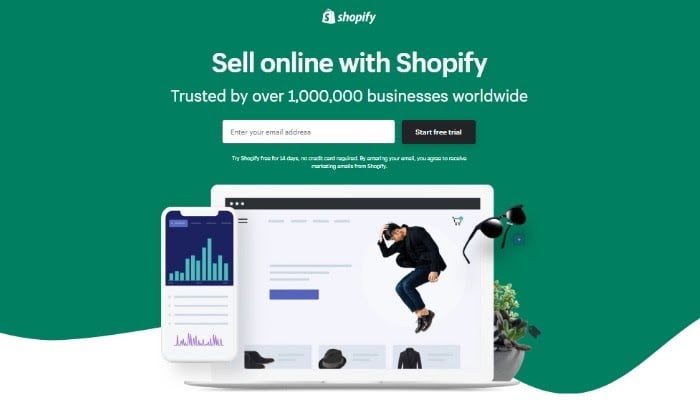
Disclosure: This content is reader-supported, which means if you click on some of our links that we may earn a commission.
One platform where you can sell just about anything to anyone anywhere? That’s Shopify in a nutshell. But once you unpack it, it’s easy to see why it powers over 1 million websites and manages billions in sales.
Gone are the days when you had to figure out how to start an ecommerce site from scratch. With Shopify, having a virtual storefront up and running is possible in a matter of minutes. It offers you plenty of marketing tools to make your store a success from the start.
Whether you’re a small business starting up or you’re already raking in millions in sales, Shopify is an extremely powerful ecommerce website builder that helps your online business empire run smoothly, capture sales, and grow.
Shopify Compared to The Best Ecommerce Platforms
So what sets Shopify apart from other ecommerce platforms out there? To put it simply, it does a great job of managing all the moving parts of an ecommerce business by being accessible, versatile, and easy to use. While there are other ecommerce platforms out there like Wix or Bigcommerce, they tend to have their limits with what you can and can’t do.
Drag-and-drop builders, customer analytics, a built-in payment processing system, 24/7 support, and ready-made templates are only the tip of the iceberg when you really look into everything Shopify has to offer. But you shouldn’t just take my word for it.
See all of our top picks to see how each ecommerce platform stacks up to ensure you’re making the best decision for your online business.
Who is Shopify Best For?
Shopify is for anyone that wants to easily start an ecommerce store and drive online sales. Because of its all-in-one nature, it isn’t just for one niche or one type of store, which is good news for you.
Shopify: The Pros and Cons
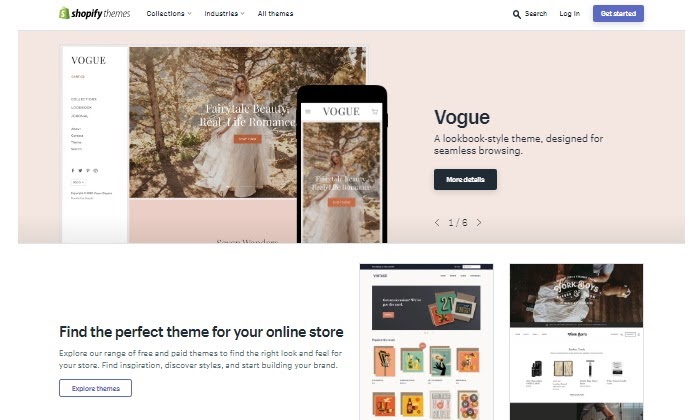
While Shopify rules in the ecommerce platform space, it might not always mean it’s the best platform for you. As with every other ecommerce platform, there are pros and cons to consider.
Pros
Built-in payment processor: With Shopify, you don’t have to worry about using a third-party payment processor. It’s all built-in for you and ready to accept payments once you’ve listed your products and hit the publish button.
With their payment processor, you can accept all major credit cards, Apple Pay, Google Pay, PayPal, Amazon Pay, and even cryptocurrency. This means one less thing to actively manage in your store and increased trust with your customers.
The ability to scale: With Shopify, you don’t have to jump ship once you see your store start to grow in traffic and sales. It’s equipped to support your store whether you’re making three or three million sales a day.
Plenty of guides and documentation: Shopify does an excellent job at providing its merchants with plenty of how-to guides, theme documentation, and an active Shopify Community help forum with over 7,000 members where you can have all your Shopify questions answered.
Accepts different types of currency: If you use its built-in Shopify Payments gateway, you can easily start selling in multiple currencies by adding a currency selector to your theme. If international customers want to see how much an item is in their currency, they can easily find out by choosing the appropriate currency.
Effective Inventory system: With Shopify, you can get an accurate handle of your inventory by tracking the number of items on hand as they sell, adjusting inventory counts, and looking at inventory history.
Free and paid apps and themes: Once you start a store with Shopify, a world of over 4,000 apps and over 100 store themes is at your fingertips. And plenty of them are free too, which is convenient if you’re starting on a shoestring budget.
Drag-and-drop theme builder: The pinnacle of “easy” as far as building an online store is concerned is a drag-and-drop builder, which you can use with Shopify to make sure your store looks exactly how you want it to–without drowning in endless code.
Stellar customer support: Once you start a store with Shopify, you can be sure its customer support is unmatched in terms of response times— especially its 24/7 chat support. It’s personally gotten me out of trouble in a matter of minutes more times than I can count.
SEO-friendly: With Shopify, your products have a real chance of ranking in search engines for keywords once you’ve optimized your products and pages. It makes this easy by providing plenty of SEO-friendly features like setting alt descriptions for images, meta descriptions, and integrating SEO apps for advanced optimization.
Cons
Higher price for in-depth analytics: With Shopify’s beginner plan you get access to a limited scope of store analytics. To access in-depth analytics that can move the needle in terms of sales strategy, you’ll have to pay for a more expensive plan.
Transaction fees for third-party payments: With Shopify, you can easily accept payment without trouble through their Shopify Payments gateway. But if you choose to go through a third party to collect a payment, Shopify does charge you fees, starting at 0.5 percent. This can eat at your profit margins.
Limited blogging tools: There’s no question Shopify is the place to sell your goods, but it is still limited as a blogging platform since it only offers you the basic blogging tools to publish content. If content marketing is a primary way you bring in sales and traffic, this is an important con to consider.
Shopify Pricing
Shopify has your standard three price points for small to medium businesses that want access to a number of different store features. But it doesn’t stop there.
It also offers a $9 a month “lite” plan as well as a more powerful Shopify Plus plan that starts at $2,000 a month for big businesses that handle high sales volumes.
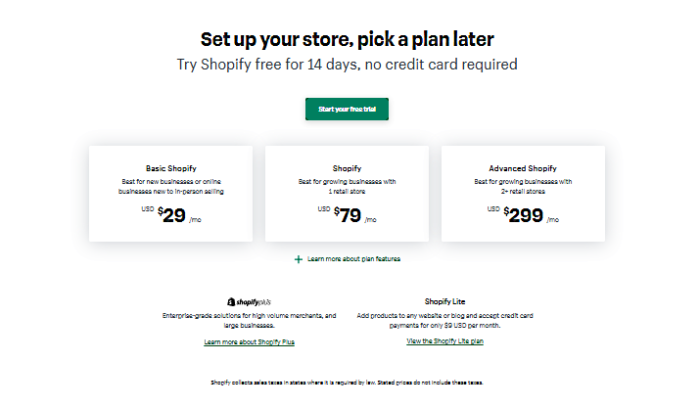
- Basic Shopify – $29 a month
- Shopify – $79 a month
- Advanced Shopify – $299 a month
Shopify’s basic tier at $29 a month offers plenty of dashboard analytics, fulfillment features, and product listing options. It’s the best tier for new businesses that are getting their start and still in the midst of figuring out sales and branding.
This tier offers unlimited product listing and two admin accounts.
When you’re ready for the Shopify tier at $79 a month, you’ll get access to five admin accounts, a 2.6% + 30¢ credit card fee rate, and you can sell in up to two languages.
Finally, you have the Advanced Shopify option at $299 a month. This is a tier you’ll only want to sign up for once you need advanced features that’ll help you scale your business and you’ve devised a proven sales strategy with sustained sales month over month. You get a 2.4% + 30¢ online credit card rate, as well as the ability to sell in up to five languages.
Keep in mind that each tier comes with a free SSL certificate, discount codes, unlimited products, 24/7 support, additional sales channels like eBay, Amazon, Instagram, and Walmart, a full dashboard where you’ll get access to customize all your store settings, and a drag-and-drop theme builder. Before you make any real decisions, I recommend you check out their plan features page for a complete list of features for each tier.
Shopify Lite – $9 a month
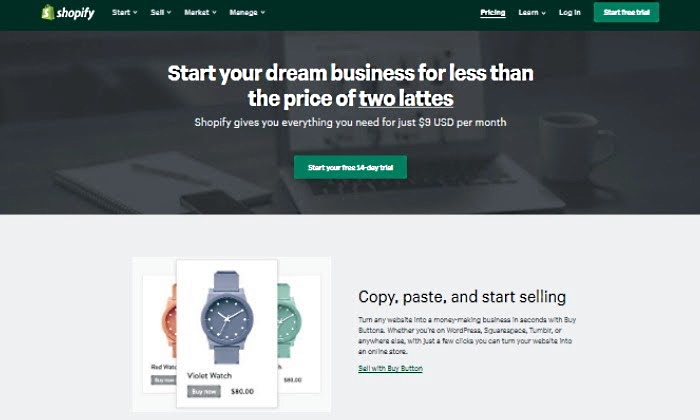
You don’t have or want a full-blown store, but still sell products or services on your own site and around the web? Just use the Shopify Lite plan as a lightweight option to cover all your bases.
The beauty of the Shopify Lite plan is in how easy it is to add buy buttons to any site you want. You can accept credit cards anywhere— both online and in-person with their POS app. Through the Shopify dashboard, you can create and send invoices as well as custom orders. Whatever you updated through your dashboard gets updated everywhere else you’ve set up points of sale online.
And of course, you’ll also have access to their 24/7 support through email or live chat. The lite plan is an excellent option for a lighter store without all the hassle. Not to mention it’s also incredibly affordable at just $9 a month.
Shopify Plus – $2,000 a month
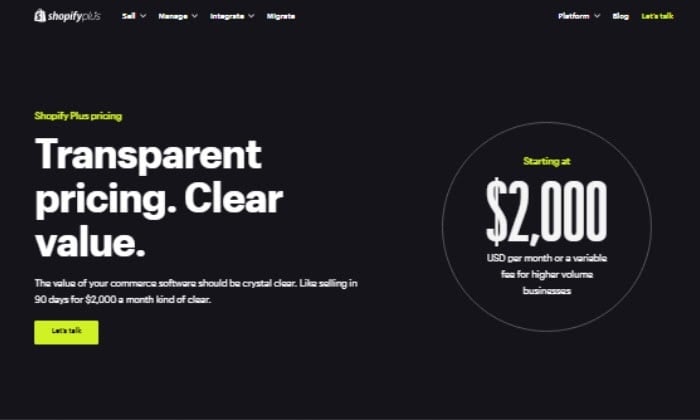
The Shopify plus solution is trusted by more than 7,000 giants including Rebecca Minkoff, Allbirds, Rothy’s, Good American, and Heinz as the best and most cost-effective solution for their ecommerce needs.
The Shopify Plus plan is designed to support smaller close-knit teams as they man millions in sales all from one place: their Shopify dashboard. This means where you once needed 300 people to run your store, now you only need 30. Also, if you’re re-platforming to Shopify, instead of taking the traditional 6-8 months to transfer the bulk of your store, with Shopify that time gets cut in half.
This may sound like an exaggeration, but it’s not–especially when you consider some of this plan’s features.
Here are some of Shopify Plus’ best and most powerful features:
- 60% faster checkouts and 18 percent higher conversion rates
- Built-in AR, video, and 3D media for each of your product pages
- Multiple stores, languages, and currencies
- Advanced discounting and shipping rates
- 99.99% uptime so you never miss out on sales and traffic
- Avalara tax automation for automated up to date tax calculations
- Plenty of automations and integrations at your fingertips
You can forget legacy enterprise software when Shopify offers all the enterprise power you need to sell at scale successfully.
Shopify Offerings
So far we’ve gone through the exhaustive list of features Shopify offers you to successfully host, stock, and run an online store. But everything I’ve highlighted so far is only the beginning.
Shopify offers a wide variety of additional tools— some free and some paid— that push you along your journey to ecommerce success.
Here’s a quick list of additional Shopify tools you’ll have access to when you host a store on their platform:
- Facebook ad integration – perfect for driving paid traffic to your site
- Google ad integration – perfect for PPC campaigns for paid Google traffic
- Shopify ping apps – A free messaging app to reach more customers and chat with your team
- Business name generator – Perfect if you’re clueless about your store name and need ideas
- Stock photography – Access thousands of free stock photos for your storefront
- Themes – tons of options both free and paid as well as customizable
Shopify Email
Did you know you can create email campaigns right on Shopify? Shopify Email gives you all the tools to track and create beautiful and captivating ecommerce campaigns that drive sales and keep your core customers engaged.
You can pick from a list of ready-for-you designs and get email analytics straight to your Shopify dashboard. You can add your logo and store colors for a more personalized email experience as well as segment the people on your list for more specific campaigns.
The Shopify Email feature is accessible on every Shopify plan. You get a monthly send limit of 2,500 free emails, then $1 for every 1,000 additional emails sent. Not bad at all if you don’t want to deal with the hassle of integrating a third-party email provider with your store that can end up costing you more in the long run.
Custom Domains
You can easily buy a custom domain with Shopify if you don’t want to buy it through a third party. Domain names through Shopify start at $14 a year and automatically renew each year.
This is a great option if you don’t want the name “.myshopify.com” as part of your domain name.
POS Equipment
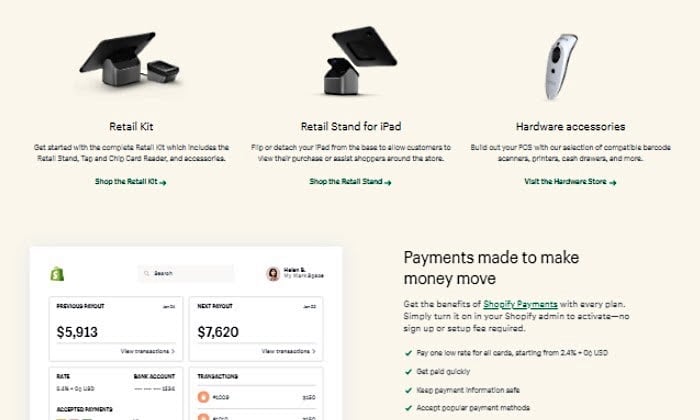
The perks of Shopify don’t end in the online world. With their point-of-sale option, you can connect POS software, hardware, and Shopify’s payment system to sell in person at popups, retail events, and more.
Once you set up POS in your online store, you can purchase Shopify card reader and payment equipment to instantly start selling.
Their most popular POS equipment for sale includes
- The tap and chip card reader – $49
- The dock for your tap and chip card reader – $39
- The Shopify retail stand for iPads – $149
- The Shopify tap and chip case – $19
But it doesn’t stop there. Shopify’s selection of POS equipment goes beyond the basics to ensure you have everything you need to sell in person without any payment issues. It’s because of well-thought-out integrated features like these that Shopify takes the crown as one of if not the most prominent and reliable ecommerce platforms.
The Best Ecommerce Platforms
Choosing the best ecommerce platform to create your store and drive sales can be overwhelming. Make sure you look through my top list of ecommerce platform recommendations to be sure you’ll have all the tools and features you need.
- Wix – Best for flexibility and customization
- Squarespace – Best ecommerce platform for creatives
- BigCommerce – Best for medium to large stores
- Shopify – Best all-in-one ecommerce platform
- WooCommerce – Best for WordPress websites
- OpenCart – Best for selling digital products
- Ecwid – Best for integrating with your current platform
All in all, Shopify offers a reliable ecommerce platform with the tools and features to ensure you’re running a smooth operation whether you’re an up-and-coming store or you need to manage millions in sales. Because of how easy it is to use, along with the tools it provides and its price points Shopify comes in as one of my top recommendations for starting a store in any niche.
Try Shopify free for 14-days and get started building your store.
The post Shopify Review appeared first on Neil Patel.
Shopify Review
Publicado Primeiro em Neil Patel
Nenhum comentário:
Postar um comentário